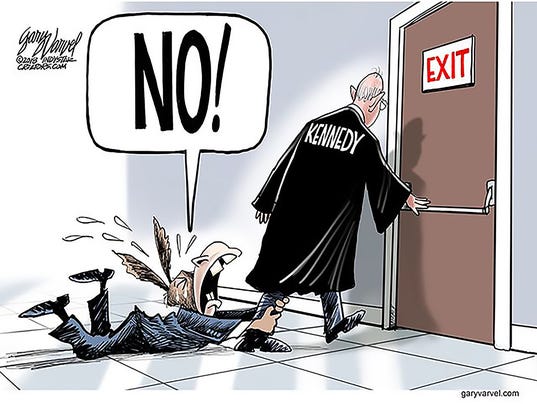
Will the US Supreme Court Turn Back the Clock on History?
(Poland) on 4 July 2018
by Tomasz Zalewski (link to original)
The departure of 81-year-old Supreme Court Justice Anthony Kennedy from the U.S. Supreme Court due to voluntary retirement is terrible news for progressive liberals in the United States. Kennedy, appointed 30 years ago by President Ronald Reagan, appeared to be a very moderate conservative, and in numerous important cases, he joined with liberal judges in the court’s decisions. In this way, for example, Kennedy blocked efforts to restore the ban on abortion, a ban which was abolished in the 1973 case of Roe v. Wade and endorsed by religious fundamentalists. Kennedy also stopped efforts to overturn affirmative action, a policy favoring racial minorities with respect to university admissions, employment and granting government contracts. In 2015 Kennedy cast the deciding vote for legalization of same-sex marriage.**
In the more or less equally divided court in terms of the world’s view, Kennedy often tipped the scales in favor of one side or another. However, over the last several years, he has voted with conservatives on the bench, for example, in favor of Jack Phillips, a pastry chef who refused to bake a wedding cake for a gay couple, and affirming Donald Trump’s executive order forbidding citizens of several Muslim countries to enter the United States.
What Do Changes on the Supreme Court Mean for America?
Trump will almost surely fill the vacant spot on the Supreme Court with a justice who will join a conservative bloc which includes Chief Justice John Roberts, Justice Clarence Thomas, Justice Samuel Alito and Justice Neil Gorsuch.* And Trump will probably not have to struggle with the decision the way his predecessor did.
What does this mean for America? We can expect that the court will rule in line with the Republican Party’s positions, sustaining the beliefs of the white majority in the U.S., or, if you will, the oligarchy (sic), ruling on their behalf (however not always in their favor). Therefore, for example, the court might uphold the practice of gerrymandering (manipulating election districts, a practice which was enacted by Republican state legislatures to ensure their candidates’ success in Congressional elections). Or the court might further find that state laws which restrict voting rights for African-Americans and Hispanic citizens are constitutional.
Left-leaning liberals can also say goodbye to their hopes for a rapid reversal of the Supreme Court’s 2010 decision which granted corporations the right to make unlimited campaign contributions (Citizens United v. the Federal Election Commission).
Will the Supreme Court Overturn Its Decisions Dealing with Social Values and Beliefs?
In any case, an even more conservative Supreme Court will not turn back the clock when it comes to morals and social norms. The abortion rights movement fears that the court will overturn the right to abortion, but that does not seem likely. The Supreme Court has upheld various restrictions on abortion, but it’s hard to believe that it will fully uphold a ban that existed 40 years ago, similar to the kind of restrictions that Poland or some Hispanic countries have enacted.
On a similar note, the Court will probably not restore the ban on same-sex marriages. The Supreme Court, despite it being apolitical, is not deaf to public opinion, and all the polls suggest that Americans are becoming increasingly more liberal when it comes to morals and cultural matters. On the other hand, even conservative judges are likely to disagree with the idea of the U.S. exerting such control over its citizens, which will eliminate concerns about whether Trump will gain excessive power.
The Balance of Power after Kennedy’s Departure
The current right-leaning bloc on the Supreme Court will not always remain consistent, even after Kennedy leaves. His role as a centrist may be assumed by Justice Roberts, who, a couple of years ago, blocked an attempt to reform the health insurance system, reform which was pushed by President Barack Obama. But the prospects for liberals in the U.S. are not that positive, because after Trump appoints Justice Kennedy’s replacement, he will probably have an opportunity to nominate another tough conservative given the two aging liberal justices, 79-year-old Stephen Breyer, and 85-year-old Ruth Bader Ginsburg (who is also ailing) currently on the bench.
That is why The New York Times is warning that the only salvation from a further drift to the right is mobilization of the liberal left in the upcoming midterm elections so that Democrats can gain the majority in Congress and block Trump’s nominations.
*Editor’s note: On July 9, 2018, Donald Trump nominated Judge Brett M. Kavanaugh, a federal appeals court judge, to the United States Supreme Court to fill the seat vacated by Justice Anthony Kennedy.
** Editor’s note: Anthony Kennedy wrote the opinion for the 5-4 majority in the 2015 case of Obergefell v. Hodges, which guaranteed that the fundamental right to marry is guaranteed to same-sex couples.


